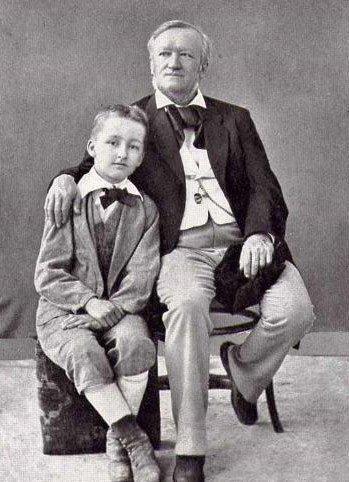
German Music History: Composers--19th Century

Figure 1.--Wilhelm Richard Wagner (1813-83) operas, mainly the 'Ring of the Nibelungen' and 'Parsifal,' gave to music a new status in pushing melody to its finest refinements.Here we see a portrait of Richard Wagner and his son Seigfreid taken in 1880.
|
|
Beethoven whose life and work spanned the 18th and 19th centuries gave us a preview of all the coming music. At the turn of the 19th Century, Beethoven composed the 'Eroica' sumphony which he dedicated first to Napoleon Bonaparte, who he saw as a leader able to break down absolute monarchy in Europe, as the Revolution did in France. Napoleon proceeded, however, to crown himself Emperor, a new Charlemagne. [Michel: I think this bit probably goes better with out political connotation page, but lets see how the page develops.] He also contribute to the weakening of the Austro-Hungarian Empire. He married the archduchess (princess) Marie-Louise, the daughter of Emperor Franz-Joseph. Beethoven refused to dedicate his symphony to a new emperor who would not be different than the old regime monarchs. There is something in this Third Symphony as a collapse which expresses something like the death of Medieval values and the rise of new ones: Liberty, Fraternity, and Equality which came from the French Revolution. Beethoven gave to music this freedom which was unknown during the previous century. His 'Ode to the Joy' is perhaps the supreme example of this. Romanticism with Johannes Brahms (1833-97), Frédéric François Chopin (1810-49), Felix Mendelssohn (1809-47), and Robert Alexander Schumann (1810–56) are the end result of his musical experiments. Wilhelm Richard Wagner (1813-83) operas, mainly the 'Ring of the Nibelungen' and 'Parsifal,' gave to music a new status in pushing melody to its finest refinements. Even if Brukner or Malher gave to the symphony something similar to Wagner's operas, there was a feeling that nothing more could be done to creativeness in music. Take note that in visual arts , the same thing happened with Impressionism. Gradually, painting ceased to be a copy of external reality. The next move came from France. Claude-Achille Debussy (1862– 1918) and Joseph-Maurice Ravel (1875–1937) initiated a new kind of music based on foreign countries like Balinese music. Also, those composers returned to some classical composers like Couperin and Rameau. Many people thought that this music would be the right answer to the diktat of German Music.
HBC

Navigate the Boys' Historical Clothing Web Site:
[Return to the Main German music history--German composers]
[Return to the Main German music tradition]
[Return to the Main German activities page]
[Return to the Main music country page]
[Introduction]
[Biographies]
[Chronology]
[Clothing styles]
[Countries]
[Photography]
[Bibliographies]
[Contributions]
[FAQs]
[Glossaries]
[Images]
[Links]
[Registration]
[Tools]
[Boys' Clothing Home]
Created: 10:42 PM 8/18/2010
Last updated: 10:42 PM 8/18/2010



